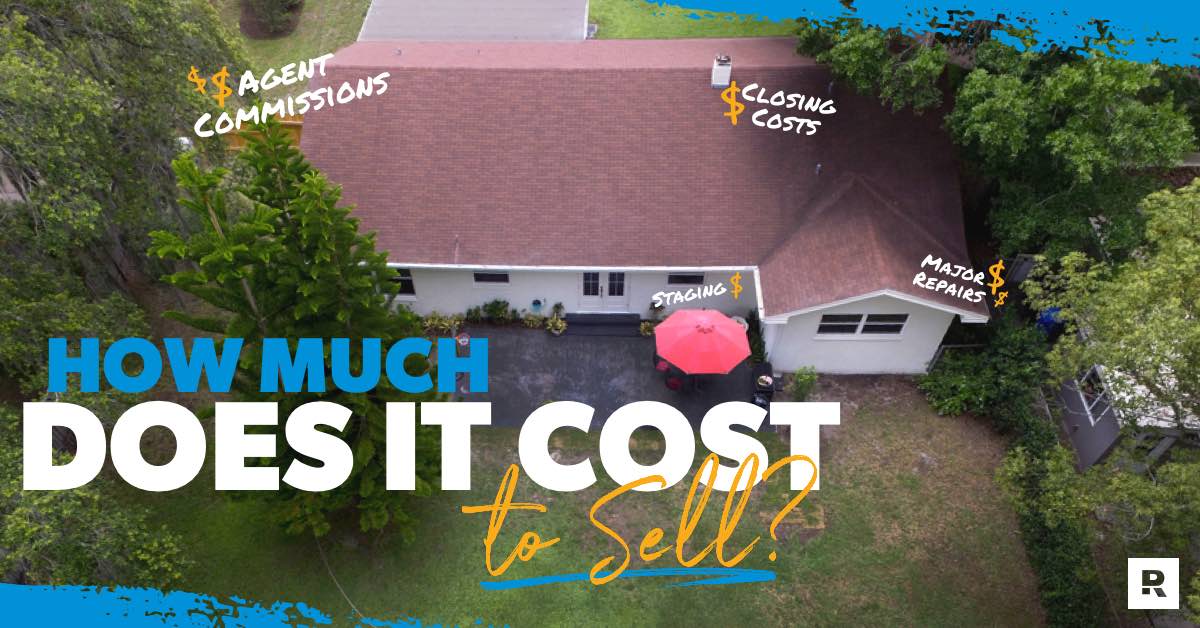How Much Does It Cost to Sell a House?
8 Min Read | Sep 8, 2023

So, you’re ready to sell your home to start a new adventure, and you’re wondering, How much does it cost to sell a house? Some sellers don’t realize how expensive selling a house really is until they begin going through the process. But that won’t be you!
To make sure nothing catches you off guard, we’re going to take a look at the most common expenses people run into when they sell their home. That way, you can plan ahead, make a good a budget, and sail through the stormy seas of real estate.
Ready? Set. Go!
What’s the Cost of Selling a House?
The average cost to sell a house is in the neighborhood of 15% of its sale price—which includes agent commissions, home improvements, closing costs and moving expenses. So if you sell a home for $300,000, you might pay around $45,000 to cover selling expenses.
That may sound like a lot. But keep in mind, the cost to sell a house is different for every seller. In fact, you might be able to skip certain selling expenses depending on your situation.
Here’s what a home-selling budget might look like:
|
Home Sale Price: $300,000 |
Seller’s Cost |
Percentage of Sale Price |
|
Real estate agent commissions |
$18,000 |
6% |
|
Closing costs |
$9,000 |
3%1 |
|
Home inspection |
$3412 |
<1% |
|
Improvements and repairs |
$13,2343 |
4% |
|
Home staging |
$1,7734 |
<1% |
|
Moving costs |
$1,7155 |
<1% |
|
Total selling costs |
$44,063 |
14.69% |
The numbers in this budget are only rough estimates of what a seller might pay when selling a $300,000 home. To get a better idea of how much these budget items will cost in your situation, let’s unpack each category.
With the right agent, taking on the housing market can be easy.
Buy or sell your home with an agent the Ramsey team trusts.
Real Estate Agent Commissions
When you sell a house, one of the main expenses will likely be the commission fee—a cut of your earnings that goes to the real estate agents who helped you seal the deal.
The standard commission is typically 6% of your home’s sale price—split between the seller’s agent and buyer’s agent. So if you sell a $300,000 house, $18,000 of that will go to the real estate agents (or $9,000 each).
That may seem like a lot, but paying for a real estate agent is worth every penny. Here’s why: Agents who eat, sleep and breathe real estate can communicate the right expectations so you’ll feel confident throughout the selling process. They’ll give you experienced advice about how to prepare your home for buyers and give you a tried and true marketing plan to get your home sold on your timeline. Agents can also earn you the big bucks by providing muscle at the negotiating table.
All that expertise pays off for you when your home sells. In 2019, sellers who worked with an agent sold their homes for a median of $345,000—that’s $120,000 more than people who didn’t use an agent.6 Cha-ching!
So, while some folks may try to tell you that selling without an agent is a good way to save money, they’re just plain wrong. It’s a bad idea!
Closing Costs
There are a few other miscellaneous closing costs you’ll have to pay in addition to agent commissions. These include prorated property taxes for the year, remaining HOA fees, lender’s title insurance, title transfer, attorney costs, and other government fees that depend on where you live.
In some cases, you might want to sweeten the deal by offering to cover some of the buyer’s closing costs too. This is known as a seller concession, and it can make your listing stand out from the crowd.
Home Inspection
A home inspection, which runs around $280–400, can uncover problems with plumbing, electrical systems, HVAC, the roof or even the foundation a house is sitting on.7 That way, you can fix any issues you find before you list the house for sale, or you can adjust your sale price and list the home “as-is.”
Find expert agents to help you sell your home.
Typically, the buyer pays for a home inspection to avoid getting hoodwinked into buying a money pit. But if you budget for an inspection before listing your home, you’ll have a chance to fix things ahead of time. That way, home repairs won’t slow down the closing process—or cause frantic buyers to change (or cancel) their original offer.
Improvements and Repairs
In 2022, 71% of sellers made at least one improvement to their home before selling it, and you may want (or need) to do the same.8 Common improvement projects include landscaping the yard, updating bathrooms and kitchens, replacing carpet or flooring, painting the exterior, and redecorating.
Your home inspector may also discover you need some repairs, and those can be costly—major home repairs cost $13,234 on average.9 If your house is brand-spankin’ new, you probably don’t have to worry about this. But if your house was built by Pilgrims, it might need some work.
Home Staging
Home staging is all about transforming your house into a warm, welcoming space buyers will want to call their own—which means bigger bucks for you on a faster timeline. The cost of staging a home will depend on how much work your home needs to get it ready and how much of the work you manage to do on your own. On average, home staging costs $1,773.10
Staging costs include things like hiring a staging company, ordering cleaning services, renting furniture, installing brighter lighting, updating cabinets, and applying a fresh coat of paint.
Keep in mind, these costs might be covered by your real estate agent as part of their marketing services.
Moving Costs
Moving your stuff out of your house costs $1,715 on average.11 There are many ways to handle moving costs, such as—you guessed it!—renting a moving truck or hiring a moving and storage company.
But remember to work within your budget and savings. Hiring a moving team can cost a lot of money, so if you have the budget for it, great! If you don’t, there’s no shame in borrowing the neighbor’s minivan and paying your friends with pizza to help you pack up.
Remaining Mortgage Balance
If you’ve got a mortgage on your home, another closing cost you’ll pay is the remaining loan balance—which should be covered by what you make on the sale.
For example, let’s say after 10 years of paying down your mortgage, you’re left with a remaining balance of $80,000. Now suppose you sell your home for $300,000. You use $45,000 of the sale earnings to cover selling expenses and $80,000 to pay off the mortgage. That leaves you with $181,000—a pretty sweet down payment for your next home!
If, for any reason, you’re upside down or underwater on your mortgage (meaning the loan balance is higher than the current value of your home), now probably isn’t a good time to sell your house. Because if you did sell, you wouldn’t earn enough money to pay off your mortgage. Plus, you’d have to pay all the costs that go along with selling a house.
So hang tight and keep paying down your mortgage if it’s upside down. Letting the value of your home grow until you can earn enough from the sale to knock that mortgage out of the park!
How Can I Reduce the Cost of Selling My House?
Charge up your power tools and grab the safety goggles because the first way to save on home-selling costs is by tackling home projects yourself—DIY-style! If you have a knack for things like landscaping, carpentry or painting, you could pluck some zeros off your home repair and staging costs.
It’s also easy to save money on moving expenses. Start by decluttering the junk you don’t need and selling stuff you can replace after your move—because fewer items to move means lower moving costs. Ask department stores for free packing boxes, and skip the cost of hiring a moving company by recruiting free help from friends. Be sure to thank them with extra-large pizzas!
If you’re relocating for a job, you could negotiate with your employer for a relocation package. That’s when a company gives a new team member a bonus to use toward paying for their move, and they’re pretty common these days—nearly 64% of employees received some kind of reimbursement for their relocation costs in 2022.12
Ready to Sell Your House?
If you’re ready to put the calculator down and start selling, get the ball rolling with a local real estate agent. For a fast and easy way to find the top-performing agents in your market, try our RamseyTrusted program. We only recommend reliable agents who make it their personal mission to help you crush your real estate goals.


